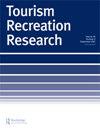价值论转向对旅游研究是否可行?重新研究平台模型
IF 2.6
Q1 HOSPITALITY, LEISURE, SPORT & TOURISM
引用次数: 1
摘要
旅游学者的制度化是为了提高价值,以确定对某些更大的利益有益,并以有意识和无意识的方式发挥其指定的作用。许多人发现自己在不同的院系、学院和学校工作,他们的工作是基于他们所属机构所决定的价值观,但也基于他们的个人信仰和教育背景。这种学术角色的相互作用很重要,因为它创造了真实和想象的世界,学生、同事和社区成员从中建立自己的世界。世界是很自然地创造和评价的,它们是由学者的价值观与他们所处环境的价值观相互作用而形成和形成的。因此,每个旅游学者都应该问自己:为什么要教旅游?这个问题可能会突出旅游研究的脆弱性和可行性。本文对北欧五个国家的大学提供的旅游学位进行了调查。数据揭示了哪些价值观主导了旅游教育,但本文论点的意义在于理论框架,这是Jafar Jafari最初的平台模型及其后来的改编的价值论发展。本文的结论是,当前的旅游研究应该从价值论上充实,而不是从本体论或认识论上充实。本文章由计算机程序翻译,如有差异,请以英文原文为准。
Is an axiological turn viable for tourism studies? Reinvestigating the Platforms model
ABSTRACT Tourism academics are institutionalised to enhance values determined to be of benefit to some greater good, and to play their assigned roles in both conscious and unconscious ways. Many find themselves in different faculties, colleges, and schools, doing their jobs based on values determined by their institutional belonging, but also based on their personal beliefs, and educational backgrounds. This interplay of academic roles is important because it creates worlds, real and imagined, that students, colleagues, and community members build theirs from. Worlds are made and evaluated quite naturally, they form and are formed by the academics’ values in interplay with the values of their contexts. Each tourism academic should therefore ask themselves: Why is tourism taught? This question might highlight vulnerabilities and viabilities of tourism studies. This article presents an investigation of tourism degrees offered at universities in the five Nordic countries. The data exposes what values dominate tourism education, but the significance of the argument in this paper arises from the theoretical framework, which is an axiological development of Jafar Jafari’s original Platforms model and its later adaptions. The conclusion drawn is that current tourism studies ought to be enriched axiologically, rather than ontologically or epistemologically.
求助全文
通过发布文献求助,成功后即可免费获取论文全文。
去求助
来源期刊

Tourism Recreation Research
HOSPITALITY, LEISURE, SPORT & TOURISM-
CiteScore
11.30
自引率
7.10%
发文量
77
期刊介绍:
Tourism Recreation Research is a multidisciplinary international journal now published quarterly; it focuses on research problems in various tourism and recreational environments — ecological, economic, and socio-cultural — and attempts to seek solutions for sustainable development. Contributions are also encouraged on fundamental research concepts and theories. The journal carries regular features such as Research Note, Post-Published Reviews and Book Reviews. The ‘Research Note’ provides opportunity for scholars who have attained sufficient maturity to establish reliable findings in their field of research. The ‘Post-Published Review’ section has been introduced to capture deep insights into the papers that have already been published in Tourism Recreation Research to fill in gaps in the received information. Strong emphasis is laid on original research and readable prose.
 求助内容:
求助内容: 应助结果提醒方式:
应助结果提醒方式:


